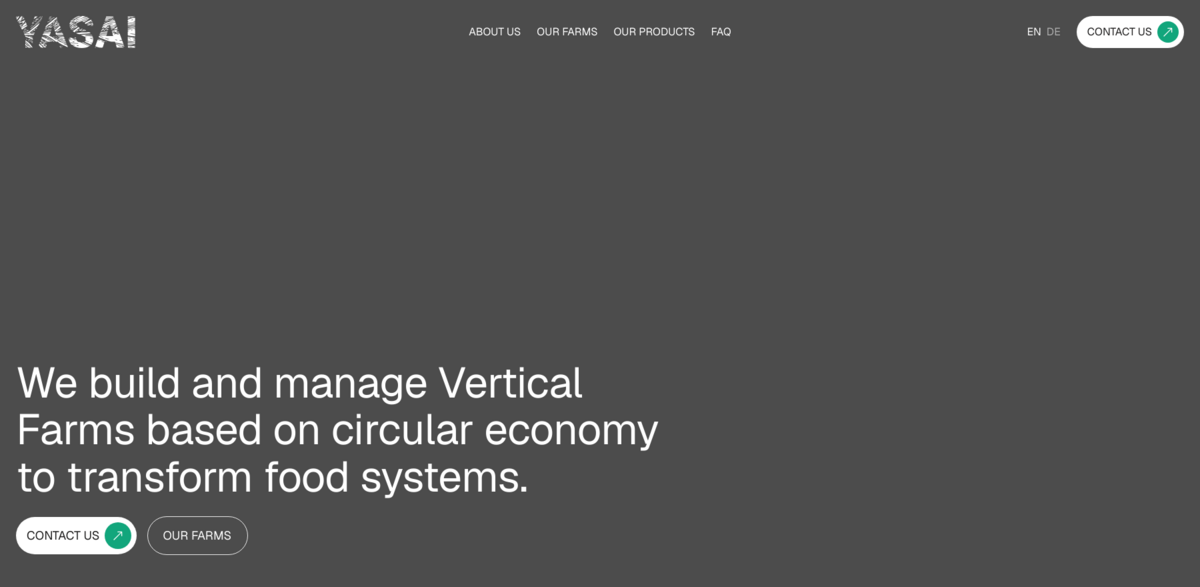What is the Vertical Farming Project?
The project builds and manages vertical farms based on circular economy principles to transform food systems. YASAI’s vertical farms grow up to 200× more per m², use 95% less water, and run on renewable energy—delivering fresh, pesticide-free produce directly to consumers. With AI, IoT, and hydroponics, YASAI automates year-round production. Their Zurich farm supplies 600+ supermarkets and even recycles waste heat using circular systems. It is a dynamic, technology-driven response to the challenges of feeding a growing global population while preserving our natural resources.
Main Benefits at a Glance
- Up to 200× more produce per m²
- 95% less water consumption
- Powered by renewable energy
- Supplying 600+ supermarkets with fresh, pesticide-free produce
- Circular systems that recycle waste heat
This snapshot showcases the compelling advantages offered by the YASAI model, which highlights both efficiency and sustainability.
Revolutionizing Food Systems
By 2050, while the world will need to feed 10 billion people using the same resources currently available, traditional agriculture is facing major challenges. Extensive agricultural practices and climate change have led to a significant decline in biodiversity, and dwindling supplies of arable land and clean water have put food production at risk. In response, vertical farming delivers high-quality, locally grown produce at a lower cost and with many fewer resources than traditional agriculture. Growing crops in cities drastically cuts food miles and reduces food waste by eliminating carbon emissions associated with long-distance transportation. It’s a game changer in rethinking and reforming the food system.
Innovative Integration of Technology
The project leverages cutting-edge technology with a holistic design approach. With a potent blend of machine learning, artificial intelligence, and IoT systems, YASAI’s vertical farms operate on autopilot around the clock. The use of smart sensors, deep tech, and controlled environment agriculture ensures that plants grow in perfect conditions, all year round. These technological integrations not only optimize production but also deliver sustainable, innovative food solutions that are essential in today’s climate tech and agritech sectors. The infusion of technology is integral, ensuring efficiency and a reduced environmental footprint.
Diverse Applications and Custom Solutions
The versatility of the project is evident in its approach to catering to different scales and needs. From small scale vertical farms tailored for gastronomy and home use to medium scale implementations in repurposed industrial halls, the project adapts to its environment. For large-scale operations, YASAI designs and builds innovative food factories in former mining landscapes, ensuring food security on a national level. Whether located in a FoodDesert, a Smart City, or even at one’s home, this model of novel farming supports local communities by growing fresh, exotic, and healthy food using automated systems and synergies to keep operational costs as low as possible. It’s about growing local while thinking global… and doing so sustainably.
GreenState AG and the Evolution of Vertical Farms
GreenState AG, incorporated in early 2021 during the Covid-19 pandemic, has set the stage for a revolution in local food production by developing both software and hardware technological solutions for vertical farming. With nearly 100 employees, the company has built two industrial vertical farms that boast an operational growing surface of more than 2,000 m² and an annual production of over 30 tons of herbs and microgreens. The final stage, known as the XL Farm, will expand to feature 10,000 m² of operational growing space with projections to produce 300 tonnes of herbs and 500 tonnes of lettuce annually. This spinoff project combines agritech expertise with a deep commitment to innovative food production within smart cities and controlled environments.
Project Impact on Sustainable Development
- SDG 2: Zero Hunger – By providing fresh, locally grown produce, the project contributes significantly to food security.
- SDG 6: Clean Water and Sanitation – The model’s 95% less water usage supports sustainable water management.
- SDG 7: Affordable and Clean Energy – Running on renewable energy reinforces the shift towards sustainable power sources.
- SDG 9: Industry, Innovation, and Infrastructure – Integrating AI, IoT, machine learning, and deep tech fosters cutting-edge industrial innovation.
- SDG 11: Sustainable Cities and Communities – By reducing food miles and carbon emissions, the initiative builds healthier, more sustainable urban environments.
- SDG 12: Responsible Consumption and Production – The circular economy approach ensures minimal waste and optimal resource use.
- SDG 13: Climate Action – Reducing the environmental footprint actively combats climate change impacts.
Looking Ahead to a Sustainable Future
The ambitious model outlined by YASAI and GreenState AG paves the way for a sustainable, efficient, and innovative future in food production. By synthesizing technology and circular economy principles, the project is more than just about farming—it is about reimagining food systems to better serve communities and the planet. With customizable designs for B2B and B2C settings, as well as a focused approach on manufacturing, commission, and agritech applications, the initiative reflects a commitment to holistic development. In today’s fast-paced world, embracing smart cities, novel farming techniques, and controlled environment agriculture is key to not only surviving but thriving under escalating resource constraints. The future might be uncertain, yet projects like YASAI’s vertical farms offer a beacon of hope. Growing perennial crops and integrating advanced technologies ensure that the journey toward 2050 is sustainable, agricultural innovation remains at the forefront, and local communities get to enjoy fresh, healthy produce every day… all while making a tangible global impact.


















